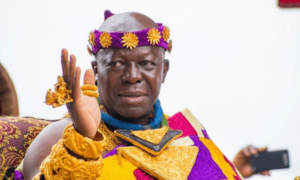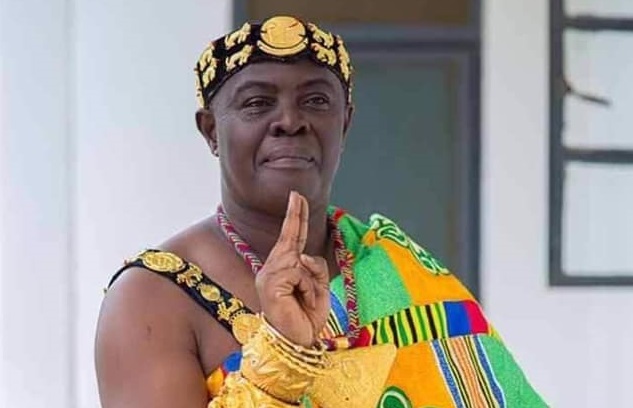The time has come for President Nana Addo Dankwa Akufo-Addo and the National Peace Council to step in and resolve the feud between the Asantehene Otumfuo Osei Tutu II and the Dormaahene, Oseadeayo Agyeman Badu II, the United Nations Peace Ambassador, Bishop Ben Owusu, has said.
In his view, the issue between the two traditional leaders can result in dire consequences if not addressed immediately.
“The time has come for the President and the National Peace Council to intervene and find a lasting solution to this. You may not notice it, but this issue is gradually getting out of hand and the earlier we addressed it the better it is for all of us. I blame the Peace Council for watching on to allow the verbal exchanges to be taking place.
“I think the Peace Council is more interested in political issues than other national issues, it shouldn’t be so,” he told journalists.
Recently, while commenting on this issue, the Minister of Chieftaincy and Religious Affairs, Stephen Asamoah Boateng (Asabee) told all traditional rulers to recognize that Ghana is now a democratic state governed by the rule of law.
He said there was no need to engage in verbal warfare to demonstrate one’s dominance or supremacy over other tribes.
He added that the days when one tribe would wage war against the other to demonstrate their authority are over.
The Dormaahene had protested the scope of the Asantehene’s control over certain paramount chiefs whose jurisdiction falls within the political and governmental demarcated areas in other areas apart from the Ashanti Region, such as in the Bono, Bono East, Ahafo, Western and Oti regions.

But at an Asanteman Council meeting at the Manhyia Palace in Kumasi on Thursday October 19, 2023, the Asantehene replied him by recounting the history of how the Dormaa stool was elevated to the status of a paramount chief by an Asantehene.
Otumfuo Osei Tutu II explained that it was his uncle, the then Asantehene, who even elevated the status of the Dormaa stool to the level of a paramount chief.
He added that, even before Agyeman Badu I was enstooled as Dormaa chief, he Agyeman Badu I, an uncle of the current Dormaa chief, Agyeman Badu II, swore the oath of allegiance to the Asantehene.

Dormaahene Agyeman Badu II
He said it is in areas like Morocco and Saudi Arabia, where they have Kings and heads of those countries, and that, at those places the constitution recognises that there is a Kingdom, but in Ghana, the constitution does not talk about any Kingdom and therefore there is “no King” in Ghana.
The Dormaahene argued that since Ghana is a state, there is no Kingdom within Ghana for the Asantehene to be referred to as a King.
Osagyefo Oseadeayo Agyeman Badu II suggested that the mention and reference to the Asantehene in the Chieftaincy Act, was not proper and that as part of a proposal to amend the Chieftaincy Act, he, together with others, will lead a campaign for the Asantehene’s name to be removed from the Chieftaincy Act.
He said if that was not done, it would mean other chiefs, such as the Ya Naa, Nayiri and others, would also have to be mentioned in the Chieftaincy Act.
Asked about what the Chieftaincy Ministry is doing to resolve this feud between the two revered traditional rulers while speaking on the Hot Issues with TV3’s Keminni Amanor on Sunday, December 17, Mr Stephen Asamoah Boateng said “I have a difficult job in the sense that chieftaincy concerns everybody, we all come from a community where there is a chief or Odikro or Mankrado, but there are issues with how the people get enstooled or get enskinned.
So in the wisdom of Ghana’s Constitution, we guaranteed chieftaincy and also enacted an Act of Parliament to guide all of us. If you go by the Chieftaincy Act 2008 (759) and look at the constitution, it should be simple for everybody to be calm, peaceful, and live together happily, but there are emotions attached and people want to do things that are not right.”
Responding specifically to the feud, he said “It is historical, it is also something that you and I may not understand but I believe times have moved on, we are not in the ancient times, whether we like it or not those days there was no democracy so the chieftaincy institution ruled and one gets up and beat the other, the other will go and remobilize. Now we have a democracy, there is a state called Ghana and power is invested in the presidency. It has the authority of the security apparatus, so you can’t go and beat anybody you like as in the past.
“We all know that at some point, the Asantes defeated the Dormaas and it has not been easy for some people to take it. I am originally a Dankyira, we defeated them [Asantes] and they also defeated us, that was the order of the day then, but this is a historical thing, that is gone. So I believe in a modern democracy we need to be able to understand that we belong to one nation and we are one people. The most important thing is to train and develop our human capacity so that they can help to build your state, if it is Asante state or a Bono State or a Fante State, it is your people who are your citizens, rather than fight and argue and talk about what it is in the past.
“I think that it will resolve itself in a way. This incident on the Brekum matter, probably we will have to take a special look at it and try and engage both sides. The historical facts are there.”


